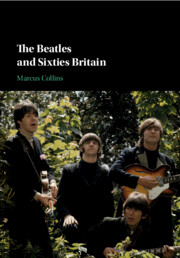Book contents
- The Beatles and Sixties Britain
- The Beatles and Sixties Britain
- Copyright page
- Contents
- Figures
- Tables
- Preface: Imagining the Beatles
- Introduction
- 1 The Other Sixties: An Anti-Permissive Permissive Society?
- 2 Society, 1963–1965: The Beatles and Modernity
- 3 Society, 1966–1970: The Beatles Go Too Far
- 4 Culture: The Beatles as Artists
- 5 Politics: The Beatles, Parliament and Revolution
- Conclusion
- Notes
- Bibliography
- Index
Introduction
Published online by Cambridge University Press: 11 March 2020
- The Beatles and Sixties Britain
- The Beatles and Sixties Britain
- Copyright page
- Contents
- Figures
- Tables
- Preface: Imagining the Beatles
- Introduction
- 1 The Other Sixties: An Anti-Permissive Permissive Society?
- 2 Society, 1963–1965: The Beatles and Modernity
- 3 Society, 1966–1970: The Beatles Go Too Far
- 4 Culture: The Beatles as Artists
- 5 Politics: The Beatles, Parliament and Revolution
- Conclusion
- Notes
- Bibliography
- Index
Summary
The introduction outlines how the book reassesses the impact of the Beatles on sixties Britain. Existing accounts have variously conceived of the Beatles as trailblazers of change, as exemplars of change or as outliers whose marginality revealed the lack of change in sixties Britain. Here the relationship between the Beatles and sixties Britain is instead conceived as one of creative tension, with the band’s divergence from societal norms provoking a full gamut of contemporary reactions: approbatory, contemptuous, ambivalent, indifferent and reformist. The book also uses different methods to study a familiar topic. It is a historical study of a subject largely studied by non-historians. Its empiricism distinguishes it from work informed by the theoretical approaches favoured by cultural critics and social scientists. It eschews the politicisation of the Beatles by writers engaged in culture wars over the sixties. It is purposely eclectic in its source materials, analytical methods and in its subject matter, which encompasses society, culture and politics. As the first book-length study of the Beatles by an academic British historian, The Beatles and Sixties Britain sets out to explain the significance of the band to twentieth-century British history, and vice versa.
Keywords
- Type
- Chapter
- Information
- The Beatles and Sixties Britain , pp. 1 - 22Publisher: Cambridge University PressPrint publication year: 2020

